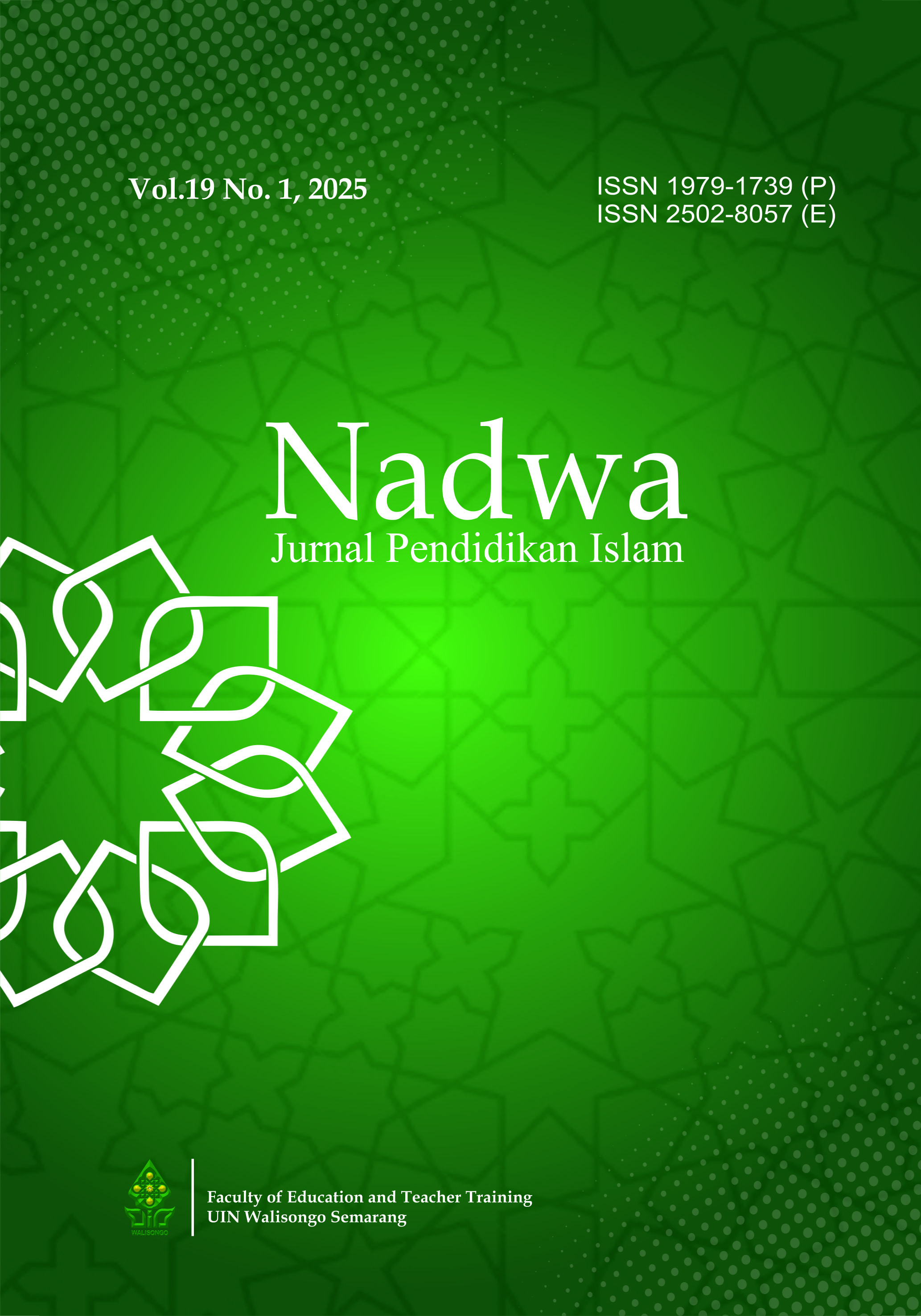Sustainable Farming Education: A Case of Non-Formal Education At Lembaga Pengembangan Pertanian Nahdlatul Ulama (Nahdlatul Ulama Agricultural Development Institute)
Main Article Content
Abstract
To mitigate the adverse effects of modern farming systems on natural resources, we need sustainable agriculture immediately. Nahdlatul Ulama (NU), the largest Islamic group in Indonesia, plays a strategic role in raising awareness and encouraging sustainable farming practices through informal education. This study investigates NU's non-formal education initiative designed to promote the shift from exploitation to conservation within the agricultural sector. Utilizing a qualitative methodology rooted in empirical analysis and literature review, the study investigates the integration of Islamic values, indigenous knowledge, and agroecological principles into farmer empowerment curricula through collaborations between pesantrens and the Nahdlatul Ulama Agricultural Development Institute (LPPNU). The results underscore the pivotal function of NU's non-formal education in augmenting farmers' ecological awareness, fostering the implementation of organic farming practices, and bolstering community-oriented food security. But there are still problems, like not having enough access to resources and not having enough policy support. In summary, NU's non-formal education programs provide a promising framework for promoting sustainable agriculture based on Islamic principles and local cultural contexts. The study offers policy recommendations for the incorporation of ecological and social sustainability into educational and agricultural development in Indonesia.
Downloads
Article Details

This work is licensed under a Creative Commons Attribution-ShareAlike 4.0 International License.
The copyright of the received article shall be assigned to the journal as the publisher of the journal. The intended copyright includes the right to publish the article in various forms (including reprints). The journal maintains the publishing rights to the published articles. Authors are allowed to use their articles for any legal purposes deemed necessary without written permission from the journal with an acknowledgment of initial publication to this journal.
The work under license Creative Commons Attribution-ShareAlike 4.0 International License.
References
1. Altieri, M. A. (2002). Agroecology: The Science of Sustainable Agriculture. CRC Press.
2. Altieri, M. A., & Nicholls, C. I. (2017). The adaptation and mitigation potential of traditional agriculture in a changing climate. Climatic Change, 140(1), 33–45. https://doi.org/10.1007/s10584-013-0909-y
3. Azra, A. (2015). Pendidikan Islam: Tradisi dan Modernisasi Menuju Milenium Baru. Kencana Prenada Media.
4. Badan Pusat Statistik. (2023). Berita Resmi Statistik. Jakarta, Badan Pusat Statistik RI.
5. Berry, W. (2012). The Gift of Good Land: Further Essays Cultural and Agricultural. Counterpoint.
6. Berkes, F. (2018). Sacred Ecology. Routledge.
7. Borras, S. M., & Franco, J. C. (2012). Global land grabbing and trajectories of agrarian change: A preliminary analysis. Journal of Agrarian Change, 12(1), 34–59. https://doi.org/10.1111/j.1471-0366.2011.00339.x
8. Gliessman, S. R. (2015). Agroecology: The Ecology of Sustainable Food Systems. CRC Press.
9. Gliessman, S. R., & Rosemeyer, M. (2010). The Conversion to Sustainable Agriculture: Principles, Processes, and Practices. CRC Press.
10. Jupp, V. (2006). The Sage Dictionary of Social Research Methods. London,
11. Thousand Oaks, New Delhi: SAGE Publications.
12. LPPNU. (2021). Pertanian Organik yang Rahmatan Lil Alamin Budidaya Padi Organik Kadang Tani Sarwa Tulus Sebuah Konsep. PWNU Jawa Tengah.
13. Masmuh, A. (2003). AGAMA TRADISIONAL Potret Kearifan Hidup (1 ed.). Yogyakarta: Lkis yogyakarta.
14. Pretty, J. (2008). Agricultural sustainability: Concepts, principles, and evidence. Philosophical Transactions of the Royal Society B: Biological Sciences, 363(1491), 447–465. https://doi.org/10.1098/rstb.2007.2163
15. Pretty, J., & Bharucha, Z. P. (2014). Sustainable intensification in agricultural systems. Annals of Botany, 114(8), 1571–1596. https://doi.org/10.1093/aob/mcu205
16. Ploeg, J. D. van der (2010). The New Peasantries: Struggles for Autonomy and Sustainability in an Era of Empire and Globalization. Earthscan.
17. Rosset, P. M., & Altieri, M. A. (2017). Agroecology: Science and Politics. Fernwood Publishing.
18. Setiyono, A. (2011). Ensiklopedi Blora: Alam, budaya, dan manusia (10 jilid). Blora: Kerjasama Yayasan Untuk Indonesia, The Heritage Society, dan Blora Pride Foundation.
19. Shiva, V. (2016). Who Really Feeds the World? The Failures of Agribusiness and the Promise of Agroecology. North Atlantic Books.
20. Tittonell, P. (2014). Ecological intensification of agriculture—Sustainable by nature. Current Opinion in Environmental Sustainability, 8, 53–61. https://doi.org/10.1016/j.cosust.2014.08.006
21. Wezel, A., et al. (2009). Agroecology as a science, a movement and a practice. Sustainable Agriculture, 2, 27–43.
22. FAO. (2021). The State of Food and Agriculture 2021: Making Agrifood Systems More Resilient to Shocks and Stresses. Food and Agriculture Organization of the United Nations.
23. IPCC. (2019). Climate Change and Land: An IPCC Special Report on Climate Change, Desertification, Land Degradation, Sustainable Land Management, Food Security, and Greenhouse Gas Fluxes in Terrestrial Ecosystems. Intergovernmental Panel on Climate Change.
24. UNESCO. (2022). Education for Sustainable Development: A Roadmap. United Nations Educational, Scientific and Cultural Organization.
25. Uphoff, N. (2002). Agroecological Innovations: Increasing Food Production with Participatory Development. Earthscan.
26. UNFCCC. (2020). Climate Action Pathway: Land Use and Agriculture. United Nations Framework Convention on Climate Change.






